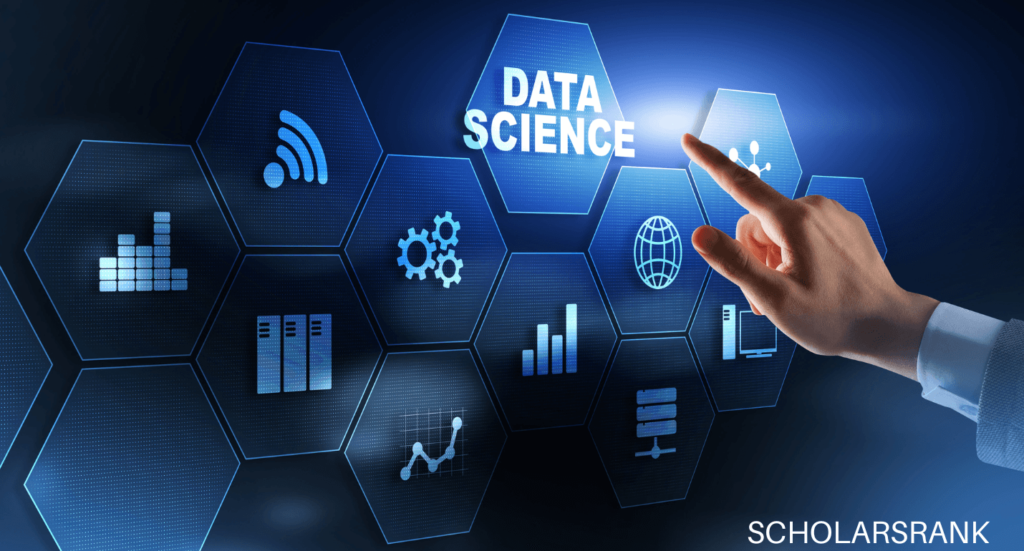Introduction
Is a masters in data science worth it? Although a master’s degree in data science can lead to higher pay and more advanced professional opportunities, is it worth your time and money?
With employment vacancies for this position increasing by 480%, data science is currently one of the industries with the greatest growth. Companies and organizations of all sizes and in all sectors are looking for data-savvy individuals who can extract value from the vast amounts of data at their disposal. Schools are introducing additional data science degree programs in response to this high demand.
To ascertain whether a masters in data science is worth it for you, we must examine your professional, educational, and financial objectives.
In this post, we’ll examine various circumstances in which earning a master’s in data science can be worth it for you in the future.
What Is Data Science?
The study and application of data to support company decisions and develop fresh customer-facing goods are known as data science, according to today’s industry experts. The analysis of data to uncover new insights is normally the responsibility of data scientists. To forecast future consumer or market behavior based on historical trends, they frequently use sophisticated machine learning algorithms.
The ultimate benefit that companies expect data scientists to provide is not anticipated to alter. But in the coming years, there will probably be a significant change in how data scientists go about achieving those objectives.
What Is A Masters In Data Science?

A Master in Data Science is an interdisciplinary degree program created to provide studies in scientific methods, processes, and systems to extract information or understanding from data in various forms, whether structured or unstructured, much like data mining.
To “understand and evaluate actual phenomena” with data, data science is defined as a branch of study and as a “concept to unify statistics, data analysis, and their related approaches.” It uses methods and theories that come from a variety of disciplines that fall under the umbrella terms of mathematics, statistics, information science, and computer science, particularly from the subfields of machine learning, statistical classification, cluster analysis, data mining, databases, and visualization.
To meet the increasing and distinctive demand for data scientists who can offer insight into many organizational difficulties and interests across several fields, degree programs in data science have evolved.
Reasons To Study Data Science In 2023
In today’s data-driven environment, learning and mastering data science has become a need for any company, making it a desirable vocation in any industry. Since the ultimate goal of data analytics is to help organizations harness the potential of their data, data analytics are especially important for digital firms. We’ve produced a list of the most important reasons for enrolling in a data science course in 2022 along with justifications for why data science, advanced analytics, and other occupations involving artificial intelligence are not just in demand now but also in the future.
- Business Optimization
A great strategy to acquire the technical skills you’ll need to significantly contribute to business improvement is by learning data science. Data scientists with specialized knowledge and expertise should anticipate swift job advancement given how vital data science is to the development of businesses.
- Educating Oneself on Cutting-Edge Technology
A set of technical skills, including the use of cutting-edge technology, are required to succeed in data science, and becoming a data science specialist implies these skills. A skilled data scientist is knowledgeable about analytics, the theoretical underpinnings of computer science, communication, and the visualization of data-driven insights. Data science, as a result, pushes people to learn about cutting-edge technologies like artificial intelligence and machine learning and fosters technical skills.
- Numerous Job Possibilities
Data scientists have access to different professions and they can operate in a wide range of industries; healthcare, IT, and security. You can work as a data engineer, data scientist, or big data manager, depending on your qualifications. In today’s data-driven society, data scientists are a popular job choice since they can generate revenue for businesses. Since data scientists are being actively sought after by many businesses, data science offers a wide range of networking opportunities.
- High Salary
The industry, location, and services offered are just a few of the variables that affect salary, which varies depending on the role. Data scientists enhance brand building through the usage of data analysis methods. The value that data science specialists provide to their companies determines how much they are paid. For instance, by taking online classes to improve your analytical abilities, you can aid businesses more effectively and possibly raise your yearly income.
- Increasing Demand
Data scientists are highly sought after globally to enhance data-driven activities as the digital world becomes more advanced day by day. Big companies that want to leverage data for commercial development need to employ the assistance of a data scientist who can collect, analyze, and interpret a huge amount of data. This is especially true for digital businesses, who are constantly searching for qualified data scientists because they need those people to provide high-quality data analytics output.
- Center of Decision Making
While many skills and responsibilities go into data science, being in a position of decision-making allows you more chances to shine. Data scientists acquire a broad range of skills, from IT knowledge to statistics. They are therefore at the center of important choices that will produce greater results. You possess excellent experience that will support the launch of your own company. Because online data science education can help you acquire the necessary abilities, you may want to learn data science to find a fulfilling job or start your own business. One benefit of efficiently using data science is this. If you want a platinum pass, you can develop your abilities and launch your start-up.
- Outweighs the Competition
Although there are many skilled data scientists, demand outweighs supply because data science is a field of study that is increasing quickly. It is still a developing field when compared to other common IT jobs. As a result, there is less competition in data science, which increases your chances of being well-known rapidly. Given the current situation, there is an imbalance between the demand for and supply of data scientists, as shown by the fact that there are still very few of them.
- Flexible Education
If you want to learn data science and advance your knowledge in this field, you don’t need face-to-face instruction. Regardless of when or where you wish to take them, a wide variety of online data science courses are available. Enrolling in a data science course through a self-paced curriculum that allows you to be equipped with data science at your own pace, allows you to push yourself and reinvent yourself.
Industries Hiring Data Scientist
Data is everywhere, therefore practically every industry needs people who can evaluate it and offer data-driven advice on purchases, choices, pricing, and other topics. Particular sectors where data science is extremely important to include:
- Government
- Gaming
- Manufacturing
- Insurance
- Healthcare
- Entertainment
Career Options For A Masters In Data Science
For their success, businesses in a variety of industries rely on data scientists to comprehend and analyze data. All areas of the workforce, including corporations, government agencies, and nonprofits, provide data scientist positions and associated vocations.
With a master’s in data science, you can arm yourself with the knowledge and abilities to pursue a variety of career opportunities, such as the following:
- Data Scientist
To assist their firm in achieving its objectives, data scientists oversee several tiers of computing, data distribution, and software development. Data analysis is listed as the primary duty of data scientists by the IT news website CIO.com. However, these experts frequently have additional responsibilities including cybersecurity, system optimization, and data mining.
Data scientists work in a variety of fields, with research, healthcare, finance, and government being some of the most common.
- Financial Analyst Manager
Want to use data to inform crucial decisions? Finance is the best department in which to have a data-based impact on your company.
Managers who oversee financial analysis acquire and analyze data on sales, profits, and investments. This is a leadership position that necessitates the capacity for effective direction-giving to team members, executives, and other stakeholders. Financial analyst managers help businesses keep realistic budgets, make wise investment decisions, and increase earnings.
- Management Analyst
An organization is more likely to be successful and effective the more efficient it is. You can use data to generate financially viable recommendations as a management analyst (also known as a management consultant).
According to the BLS, many of the data-based recommendations that management analysts offer entail raising income and decreasing costs while also enhancing current systems and staffing decisions.
- Senior Data Analyst
Senior data analysts provide top-level support and act as a point of contact for other teams and departments. The position calls for the ability to lead a team, manage projects, and do data analysis.
You can be required to make data-driven decisions as a senior data analyst that influences the entire organization. This is leadership as much as a technical function, requiring a solid grasp of data analysis and the ability to communicate findings to non-technical audiences.
- Data Engineer
Raw data may be too much to handle. To make data more accessible and understandable, data engineers use their abilities to analyze and spot trends in the data.
Data engineers can create dashboards, highlight trends, or aggregate data into clear reports, according to CIO.com. This role is most suited for those with an advanced degree in data science due to the requirement for an in-depth technical understanding of how to use databases, including the ability to interpret numerous languages of code.
Data Science Vs Data Analytics: Scope And Intention
Let’s clarify a few things before we start: Although the objectives of data science and analytics are distinct, data is their common denominator. These fields aren’t just interrelated; Data Analytics is frequently regarded as a branch or subfield of Data Science.
In a nutshell, Data Analytics focuses on analyzing datasets and uncovering insights, whereas Data Science investigates and evaluates novel ways to use and understand data.
| Data Science | Data Analytics |
| Prototypes, algorithms, and prediction models are tools used by data scientists to find novel applications for data, as well as to identify new patterns or topics that may be relevant in the future. These initiatives encourage innovation and generate queries for which we had no prior knowledge of the need for a solution. | Data analysts use their expertise to sift data, extract pertinent information, and provide solutions for companies and institutions from a variety of industries, including healthcare, finance, insurance, travel, energy management, etc. Their recommendations are put to use for other business objectives as well as to enhance the decision-making process and establish KPIs (key performance indicators). |
Data Science Vs Data Analytics:Classes
Even though you’ve certainly heard it before, the classes or disciplines you’ll study can differ significantly from institution to university and country to country. This is why it’s common for individuals to advise us that you should review each course’s curriculum to determine whether it matches your needs.
However, we still want to provide you with a general overview of what you may anticipate learning while pursuing a degree in data science or data analytics. So, consider the following examples:
| Data Science Classes | Data Analytics Classes |
| Database SystemsPrinciples of Data MiningData SecurityData Structures and AlgorithmsSoftware DevelopmentData Science classesDiscrete Mathematics | Essential StatisticsPattern RecognitionVisualizationData Analytics classesCalculus and Linear AlgebraMachines, Languages, and ComputationModeling and Statistical Decision MakingData Mining |
Data Science Vs Data Analytics: Skills
For each discipline, we’ve included several essential skills. Keep in mind that some skills can overlap despite significant distinctions:
| Data Science Skills | Data Analytics Skills |
| Programming abilities: Python, R, Scala Expertise in SQL, Cassandra, MongoDB Knowledge of visualization tools: QlikView, Tableau Software development Machine learning Proficiency in big data tools: Hadoop and Spark Problem-solving Attention to details | Proficiency in R, SAS Knowledge of SQL, Excel, Power BI Business acumen Problem-solving Attention to details Database management and reporting |
You should take advantage of any internship or placement opportunity offered during your education if you want to stand out in the job market. While your lecturers will make every effort to teach you, nothing beats getting your hands dirty and using what you’ve learned in actual situations.
Is There A Demand For Data Science?
Yes, data science positions are among the most sought-after and fastest-growing in the industry. Data Scientist positions have grown by 650 percent since 2012, and this growth is still going strong. According to the U.S. Bureau of Labor Statistics estimates, in 2026 there will be a 27.9 percent increase in demand for data science expertise.
The demand in data science has led to an increase in their wages; they are suspected to make six figures. Demand also translates into the opportunity to relocate much more easily, both domestically and abroad.
What to Take Into Account When Selecting a Data Science Master’s Program
Finally, regardless of your objectives, the data science program you choose must include the following:
- Comprehensive Curriculum
- Capstone Projects
- Networking Opportunities
- Internships
- University Reputation
- Specialization
Check, if you can, what previous graduates have done. You will then have a clear understanding of the program’s possibilities.
Conclusion
Is a masters in data science worth it? Gaining a master’s degree in data science opens up a wide range of career opportunities, including increased pay, a quicker route to leadership roles, and a greater understanding of the field’s theoretical and practical applications.
A solid foundation in statistics, mathematics, and computer languages are necessary to become a data scientist. Students can broaden their understanding and develop their skill sets in data science courses through graduate-level data science programs.
Making educated decisions across sectors is made possible by data science and data scientists. The Bureau of Labor Statistics (BLS) projects that over the next eight years, demand for computer and information technology professionals including data scientists will increase by 13%.
Frequently Asked Questions (FAQs)
Is It Worth Learning Data Science In 2023?
- Indeed, a job in data science offers excellent prospects for future progression. Data Scientist has been dubbed the most promising career because there is already a great demand, competitive pay, and many benefits.
Is A Masters In Data Science Worth It?
- Graduates with master’s degrees in data science frequently earn high wages. Gaining an advanced degree often results in a big income increase, regardless of whether students enter a master’s program in data science with a bachelor’s degree in a similar profession or if they are hoping to entirely change careers.
Does a Masters In Data Science Require Coding?
- The following crucial technical skills are necessary to become a data scientist: You must possess a thorough understanding of programming languages such as Python, C/C++, Perl, SQL, and Java. The most popular coding language needed for data science positions is Python.
You can also read, “Is A Masters In Counseling Worth It In 2023?“








